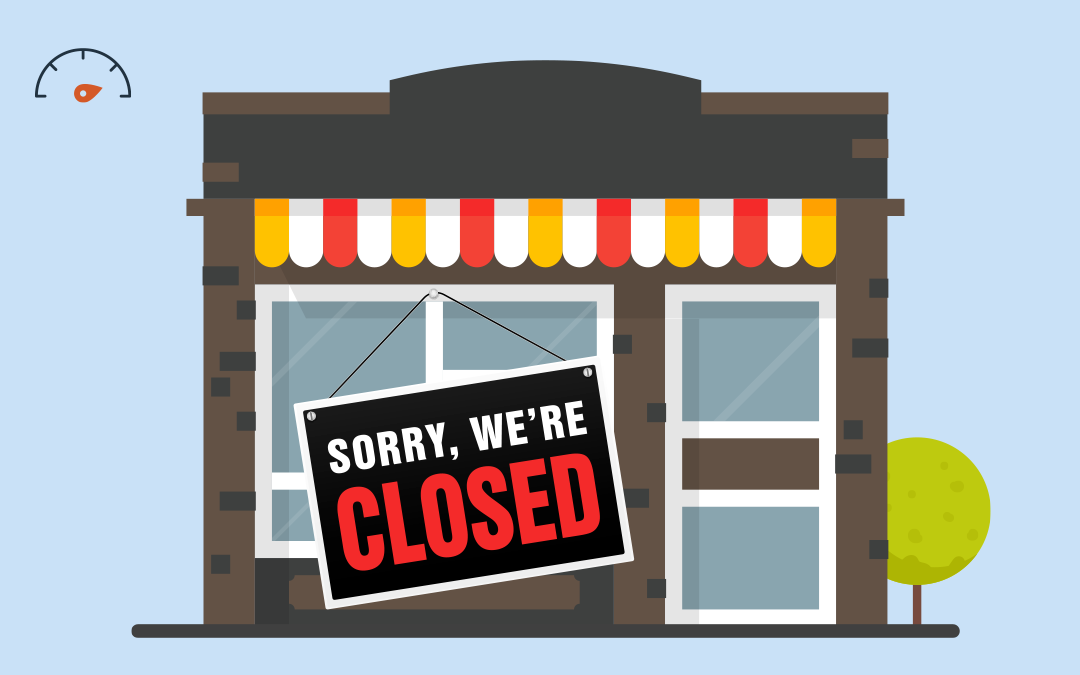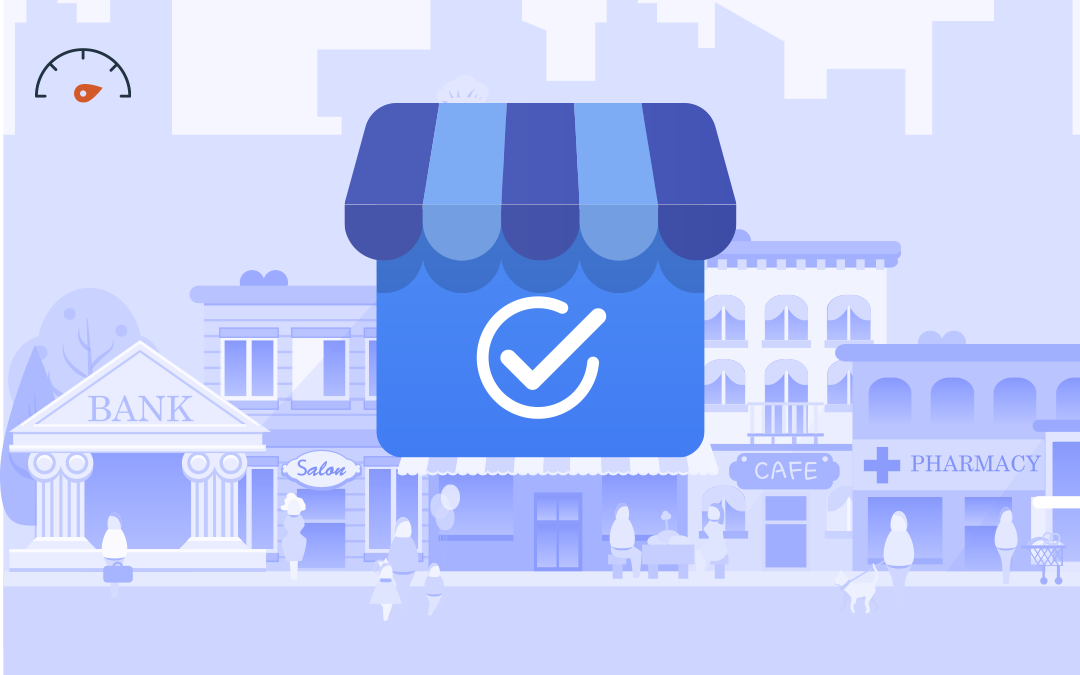Local search engine optimization is the practice of using digital marketing strategies to improve online local search rankings. With the increasing prominence of Google Search, Google Maps, and voice searches, it is now more important than ever for local businesses to compete online to be the first option customers see. Here is an in-depth guide to what local SEO is and how it can help your business!
Where Local Search Optimization Matters
While there are many places for local businesses to be found online—including local search directories—the most impactful are:
- Google Map Pack
- Google Maps
- Voice Searches
Google Map Pack/Local Pack
The Google Map Pack—also referred to as the Google 3-Pack or Local Pack—is the listing at the top of the search engine results pages (SERPs) in a standard Google search. In the Local Pack, Google only shows the top three businesses that best fit the intent of the search.
The Map Pack appears at the top of SERPs for 93% of Google searches with local intent, which means finding your way into the top three is often going to be the difference between gaining and missing new customers.
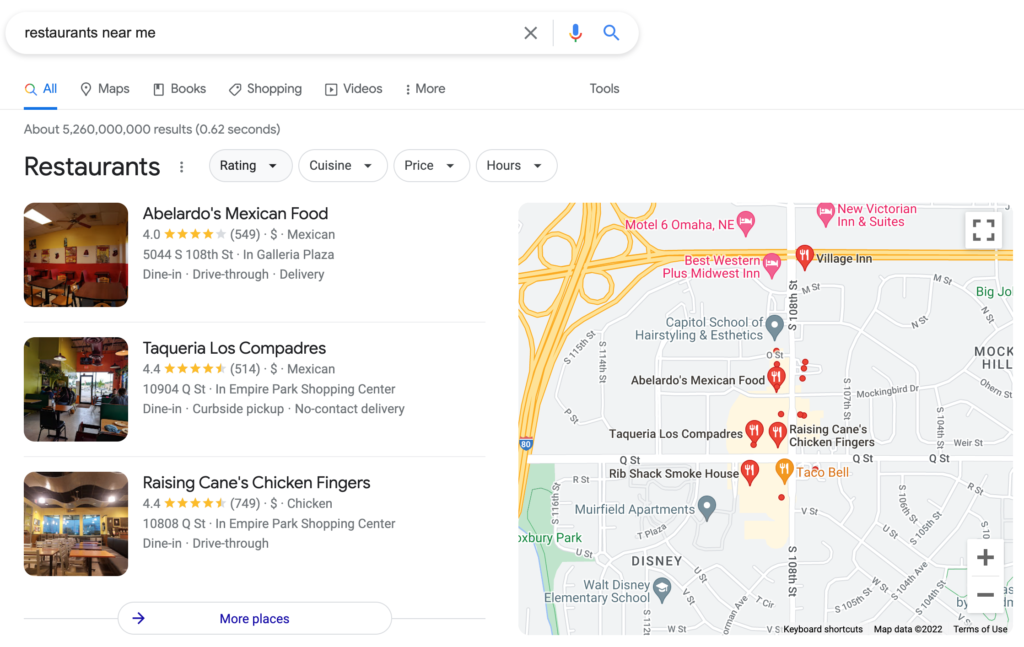
Google Maps
Google Maps is one of the most user-friendly local search directories, especially on mobile. In fact, 86% of customers use Google Maps to find local businesses. Users will enter queries like “restaurants near me” into Google Maps to find a comprehensive list of local options. These businesses are ranked in many of the same ways as the Map Pack, but Maps allows more than three options to be listed.
Some of the biggest local search ranking factors include your business’ proximity to the searcher, the completeness of your Google Business Profile (GBP), the overall sentiment of the reviews you receive, and your star rating. These factors all help determine where you will rank in Google Map searches.
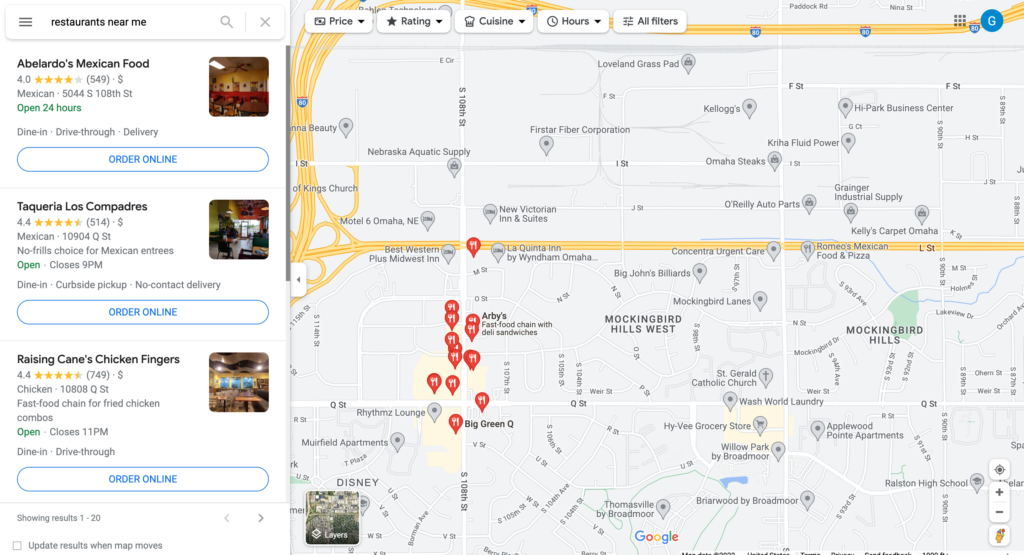
Voice Searches
Voice searches are becoming more common thanks to advances in mobile devices and smart home technology. Similar to Google, AI assistants like Siri and Alexa quickly scroll through local businesses and use attributes like distance and star ratings to determine the best option for your voice search.
Though it can be tough for local businesses to rank for voice search because only one option is offered, it is still important, especially for home services businesses.
Searchers with smart home assistants like Alexa can now call a local business from home. For example, if someone needs electrical services, they may say, “Alexa, find an electrician near me,” and Alexa will present them with the best electrician in the area.
Often, the best will be the closest electrician with a high rating that can be contacted straight from the device. If your online profile isn’t complete with reviews about the speed and quality of your service and doesn’t have your contact information easily accessible, you are essentially removing yourself from the local search game.
Why Local SEO Is Important
Local search is the place for local businesses to find customers online. The local search statistics speak for themselves:
- 97% of users have searched online for a local business
- “Near me” mobile searches increased by 136% in 2021
- 46% of all Google searches include local intents
- Over 50% of “near me” searches result in offline visits
- 28% of all local searches result in a purchase
For the best possible local search performance, your business needs local SEO. It’s not enough to appear on the list. Your business needs to try to be first because 24.4% of all clicks for a local business search go to the first result.
If you’re outperformed by just one competitor in local search, your business can miss out on almost a quarter of potential customers. To consistently appear as a top option in local search rankings, you’ll need to optimize your online presence for local search.
Local SEO vs. Traditional SEO
Local SEO and traditional SEO often want to achieve similar goals—like improving brand awareness or driving meaningful conversions. However, local SEO differs from standard SEO because it targets direct conversions and local businesses instead of national competitors.
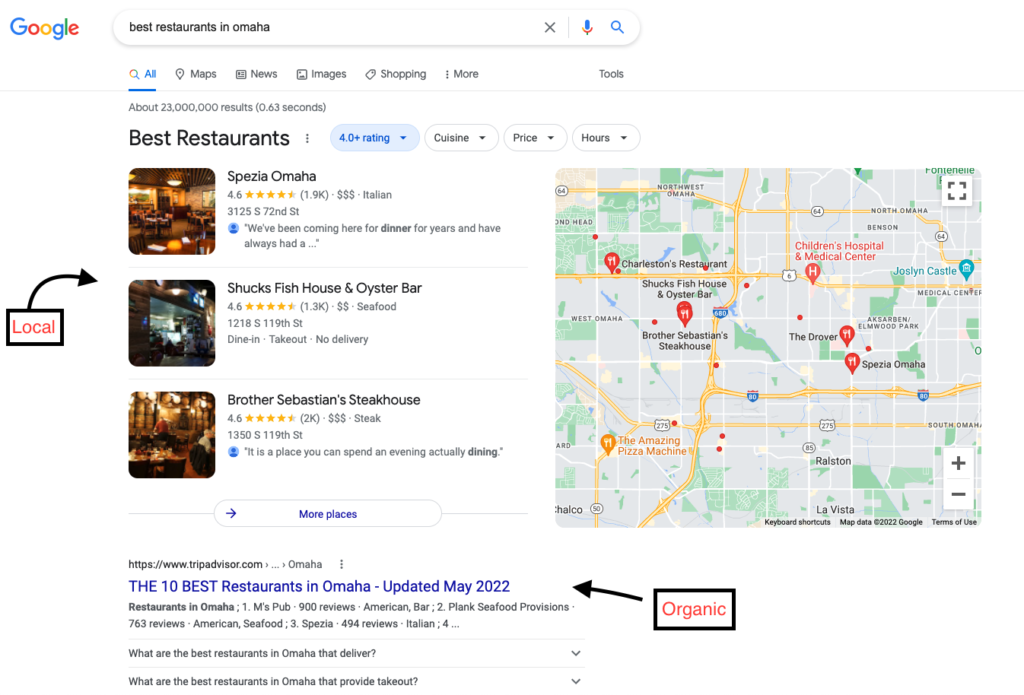
Local SEO drives results that matter to local businesses:
- Higher ranking in local search results
- Direct conversions like calls or driving direction requests
Some of the primary local SEO practices include:
- Google Business Profile (formerly Google My Business) optimization
- Building & managing local citations
Traditional SEO drives results that matter to businesses competing on the national level:
- Higher ranking in organic search results
- Indirect conversions like website traffic and higher domain authority
Some traditional SEO practices include:
- Website optimization
- Content creation & optimization
- Link building
Of course, businesses would hope to see all four benefits if they practice SEO properly, but different focuses are needed to compete locally instead of nationally.
Businesses that Need Local SEO
Any business that operates in a local area needs local SEO. From small businesses to franchise chains, local SEO needs to be the foundation of any local business’ digital marketing campaign.
Here are meaningful results that local SEO can help your small business achieve:
- More website traffic
- Increase in phone calls
- Driving direction requests
- Brand awareness
- A simplified buyer’s journey
- Higher customer ratings
- More positive reviews
And even though most businesses need local SEO, the practice isn’t going to look the same for every type of business.
Service area businesses like electricians and plumbers should drive more calls directly from their Google Business Profile listing, while hybrid businesses like locksmiths or a delivery pizza restaurant might boost driving direction requests to their physical location and drive more calls. And standard brick-and-mortar businesses like sit-down restaurants or boutiques might focus on driving more website traffic so potential customers can learn more about the products or services.
Optimizing for Local Search
Local search is important, but how do you optimize for it? Here are a few tips on how you can make local search work for you!
Local Search Ranking Factors
Google’s ranking algorithm expects businesses to do specific things with their online profile to establish themselves as legitimate. Here are a few ranking factors Google uses to determine local search rankings.
- Google Business Profile optimization
- Google Business Profile categories
- Proximity of address to the searcher
- Physical address in the service area
- Website speed & optimization
- The number and sentiment of reviews
- High-quality inbound links
Remember, Google is built to serve the user. If the search engine wants to match the user with the best option, be sure that your business profile is the best professional option.
How to Improve Local SEO
Improving your local search ranking is one of the best things you can do to find new customers. Here are a few tips on how you can start using local SEO to improve your search ranking and drive meaningful conversions.
Optimizing Your Google Business Profile
Your GBP profile is the biggest driver of local SEO success, so you should monitor it continually. Complete your profile as comprehensively as possible—with business attributes, hours of operation (including holiday hours), and frequently asked questions—to give your listing the best chance of appearing high in local search results. A complete, professional profile is not only an important search ranking factor, but it also separates your listing from competitors in your area.
Be Sure Your Vital Information Is Correct
Write the correct name, address, and phone number (NAP data) on your profile (and keep it consistent across your web presence). If this information is inconsistent, it’s a big red flag for Google that can hurt your chances of appearing in local search results.
Pick the Best Business Category
Choose the best primary category for your business and take advantage of secondary categories. Your primary category is one of the most important local ranking factors. You don’t want to miss out on someone who needs your services just because your primary category isn’t representative of your business.
Add Photos of Your Business to Google Business Profile
To appeal to customers, add photos of your business’ exterior, interior, and products to your Google Business Profile. Google prefers profiles with photos because it gives users more information about your business and what they should expect when they visit or use your services.
Respond to Reviews
Respond to positive and negative reviews on your Google Business Profile (GBP) listing to gain trust from your customers. Responses are a big trust signal for Google when determining local search ranking because it indicates to Google that you are listening to your customers. And this local search strategy can even help you earn more positive reviews.
To learn more about GBP optimization, check out these resources:
- 14 Tips to Improve Google Business Profile Ranking & Performance
- A Basic Guide to Google Business Profile Q&As
- A Beginners Guide to Google Posts
Optimizing Your Website
While your business listing is important for getting people to notice you, it won’t matter much if you don’t have a strong small business website.
When determining search ranking, Google looks at these website metrics:
- Mobile-friendliness
- Page speed
- Domain authority
- On-page optimization
- Website security
- High-quality links
Content Optimization
Optimize your website content and layout for your location(s). Use local keywords like “electrical services in Chicago” or “best burger in Boston” to further establish yourself as a local service.
Embed a Google Map Link on Location Pages
Make it easy for your customers to find your business online. Embed a Google map link and clearly display your physical address on your website. Bonus: this Google Map link also helps your SEO.
Build Multiple Location Pages
If you have multiple locations, build a location page for each with a map embed and a clear address. Plus, your location-specific Google listing should link to the location in question.
Build Product or Services Landing Pages
Customers are often searching for specific solutions instead of business types. Anticipate these searches by building landing pages dedicated to your products and services. This helps you appear in local search results while also creating a stronger user experience on your website.
Build Local Citations
The more your business and NAP data are mentioned online, the more likely it is for Google to recognize your business as legitimate and recommend you to users. However, inconsistent information across local directories can lose Google’s trust and hinder your search performance. Make sure your NAP information is consistent across directories like Bing and Yelp. Also, try driving reviews on these directories to give you the best chance of ranking high in local searches.
FAQs
How Do I Know If I Need Local SEO?
You need local SEO if you are a local business interested in finding customers or promoting your brand online.
How Long Does Local SEO Take?
Local SEO takes time to really work. Minor changes can start to take effect after four to eight weeks, whereas bigger efforts can take two to six months to reach full effectiveness. Fortunately, once the right strategies are in place, they are easily maintained.
Is Local SEO Easier than Standard SEO?
Local SEO and standard SEO are each as difficult as you make them. The difficulty will depend on your desired results and service areas. The big advantage to local SEO is that you are only competing against businesses in your service area, whereas standard SEO is used to compete against every business in your niche (including e-commerce and directory sites).
Why Is Local SEO Important for Small Businesses?
Local SEO is important for small businesses because more and more people are turning to search engines to find local businesses. Without local SEO, there is a great chance your small business will lose customers to competitors.
What Percentage of Google Searches Are Local?
46% of Google searches involve local intent.
Want to find out what local SEO can do for you? Local Search Fuel by Hurrdat offers small business websites and local citation optimization that can help you dominate the local search results. Get started today!

Grayson McCartney
After playing tennis and majoring in political science at Doane University, Grayson McCartney decided to put his education to use and became a USPTA Elite Tennis Professional in Mckinney, Texas, before changing directions and landing a Content Strategist role at Hurrdat. He has since progressed to his current role of Digital Strategist with a strong passion for tackling niche projects and helping small and local businesses connect with their audiences authentically. In his free time, Grayson enjoys trying and failing to learn the piano, playing golf, participating in weekly softball and volleyball leagues, “nerding out” about 60s & 70s music, and occasionally dusting off the old tennis rackets.

